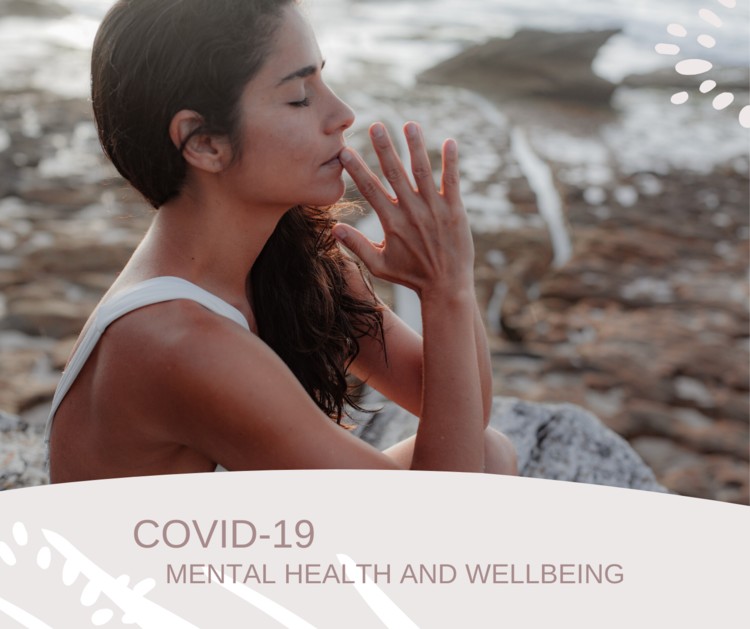COVID-19: Mental Health and Wellbeing

This pandemic affects us in many different ways.
There’s the illness itself, of course, which is particularly dangerous for older people and those with underlying health problems like diabetes. There are the economic impacts, such as job losses, falling house prices, and stock market volatility. And then there are the multi-faceted personal and mental health impacts, including COVID-induced anxiety and depression.
Mental Health Impacts of COVID-19
You may be feeling many strong emotions right now. There’s grief over the lost opportunities, postponed birthday parties, cancelled trips, or lonely baby showers. Grief, too, for any loved ones who’ve died during this period and can only be honoured in a very small funeral that you may not be able to attend.
Isolation is hard. You miss people you love but can’t see right now like elderly parents, interstate siblings, grandchildren, best mates. You might be an extrovert who’s desperately missing the energy and refreshment you get from being around lots of other people. Or maybe you’re an introvert whose quiet refuge is now constantly full of family members who are working or studying from home.
Then there’s anxiety and worry – sometimes outright fear – of what the future may hold. Will you be safe from the virus? Will your job be safe? Will your relationship survive the strains of this period? What about your kids?
As women, we easily end up bearing everyone’s burdens. You soothe your kids when they’re missing their friends or struggling with remote learning. You swallow your anxiety when the supermarket has no pasta or rice and you think of other meals you can make with what’s in your pantry. You notice your partner’s mounting stress and you find ways to show you care by making things easier for them.
But what about you?
Supporting Your Mental Health and Wellbeing During Covid-19
You matter too. It’s so easy to neglect self-care but it’s vital. You can’t pour out of an empty cup, meaning you can’t sustain caring for others without caring for yourself too.
If you always put yourself last, then ask yourself why. We all have deep-seated beliefs that drive our actions. Hypnotherapy may offer a way for you to learn how to care for others while also meeting your own needs.
Learn How Your Body Deals With Stress
Stress and anxiety trigger changes in your body. Your heart rate quickens, your muscles tense, your blood sugar rises, you feel hotter and there’s a surge of stress hormones like adrenaline. Your body is basically gearing itself up to fight off a dangerous foe or flee to safety at lightning speed. Understanding these physical manifestations of stress can help you calm your body down.
We’re in a very strange time right now. Many of the usual things you might do to refresh yourself are off the menu. You can’t change your scenery, go for a swim, or meet your friends for coffee. But there are things you can do from home to ease your stress.
Tips To Ease Stress While Staying At Home
Particularly if you’ve got young kids clinging to you, or you’re juggling working from home with homeschooling your children, aim for some bite-sized chunks of self care.
That’s because, when it comes to self-care and mental health support, a little is better than nothing. You might wish you could go for a spa day but your skin will still thank you for a DIY facial, for example.
Here are some ways to support your mental health while staying at home.
1. Feel Your Feelings
Don’t push aside feelings of anxiety or overwhelm. Find a safe place and sit with them for a few minutes. It’s OK to cry – in fact, it’s nature’s way of relieving tension. Crying helps you relax by activating your parasympathetic nervous system. It also lifts your mood by releasing feel-good hormones like oxytocin and endorphins.
2. Act Where You Can
Many of our worries and anxieties are about the future. ‘What will I do if…happens?’
If you can do something about those worries then do. If your business qualifies for government support, then do the sums and submit the paperwork. If better organisation would make your days smoother, then spend some time planning the week ahead.
But, there are many, many things about this pandemic situation that are beyond your control. Many of your worries are about things you can’t fix. And worrying even more does not change that. One way to deal with unproductive worry is to accept your limitations and keep bringing yourself back into the present moment.
3. Exercise
Exercise boosts your mental, as well as your physical, health. Among other benefits, it boosts your mood and improves your sleep. Right now, exercise is also a permitted reason to leave home. So, if you possibly can, exercise outside every day, where you’ll also benefit from fresh air, sunshine and a change of scene. Take a walk around your neighbourhood, a jog in the park or do some tai chi in your garden.
4. Deep Abdominal Breathing
Stress makes you breathe quickly and shallowly. Deep breathing helps to slow your heart rate and reduce stress. Deep breathing draws air down to your diaphragm, making your belly expand as you breathe in. You can learn how to do it here.
5. Progressive Muscle Relaxation
You can relieve muscle tension by tightening a set of muscles for about 10 seconds and then relaxing them. When you’ve finished, stay in the moment for a few minutes, just breathing slowly and enjoying the sense of physical and mental peace.
6. Handle Conflict Well
Money worries, an uncertain future, and lots of time all cooped up together at home – there’s bound to be some tension in your relationship during this time. Relationships Australia WA has some excellent advice on managing relationship tensions during COVID-19.
7. Laugh More
Did that one surprise you? Laughter has many health benefits, helping to relieve stress and tension and improve your mood.
So, feel free to watch your favourite comedy on Netflix, laugh along with the world’s best comedians, or giggle over a funny meme. It’s good for you.
Some of the frustrating aspects of family life and parenting are actually quite funny too, if you can see it. Indeed, one of comedian Michael McIntyre’s most famous sketches focuses on the exasperating yet hilarious aspects of parenting.
8. See the Good
Yes, COVID-19 has had a number of terrible impacts on people’s lives and livelihoods. Those are easy to see. But, if you dig a little deeper, you may also notice some silver linings. Perhaps you know your neighbours better than you did before, maybe your family is becoming closer, perhaps your kids are learning resilience and adaptability. In the midst of an undeniably awful situation, try to notice and appreciate the good. It changes your perspective.
9. Get Help
If you’re crying constantly or unable to relax, then seek help. Your GP is still there and very aware of the mental health impacts of isolation, illness, and economic uncertainty. We’re here for you too.
How Stellar Hypnotherapy Can Help
Stellar Hypnotherapy is a practice dedicated to holistic wellness. Stellar Hypnotherapy focuses on mental health issues such as chronic stress, anxiety, depression, insomnia, emotional eating and PTSD.
Hypnotherapy can enable you to enter a state of focused attention where you’re more open to positive suggestions that can help you move into a more health-affirming way of being.
I’ve been conducting online sessions since long before COVID-19 made us all housebound. If you’d like to book, please Book a Free Clarity Call with me today and I’ll explain the process for an online session in more detail then but all you really need is an internet connection, a computer, smartphone or tablet, and comfy seat that supports your entire back so you can thoroughly relax during the session.
